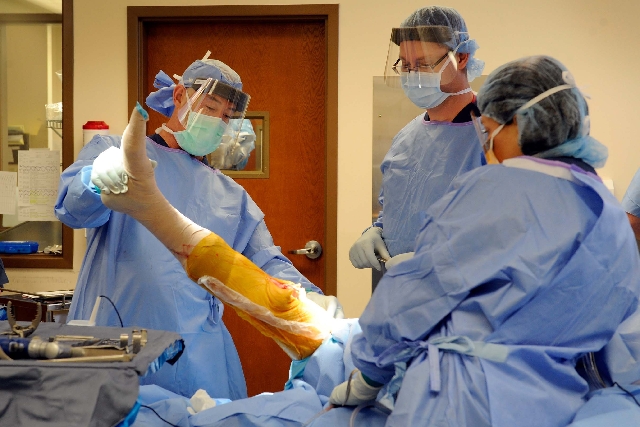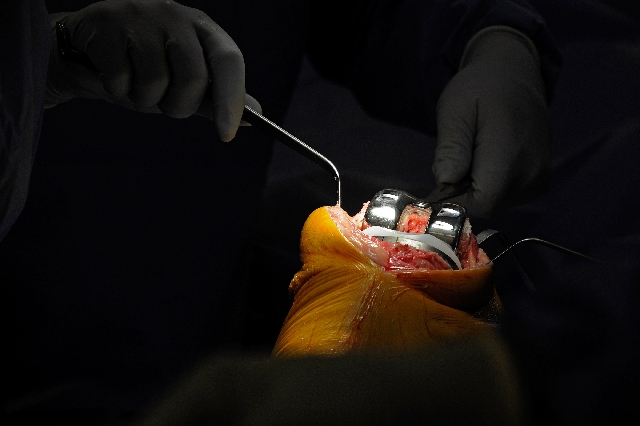Las Vegas doctor streamlines popular knee, hip replacement procedures



The pounding on a chisel to remove bone spurs, the hammering of pins to secure bone, the high-pitched whine of a drill and electric saw alternately cutting away and boring into the knee joint: The sounds of the operating room, which moments ago were beeping monitors as Dr. Michael Crovetti sliced open Earl Kimberly’s right knee with a scalpel, have become those of a woodshop.
Crovetti, 46, gripped an oscillating saw like a handgun and shaved off bone from the tibia and femur, resurfacing the bones that meet at the knee so he can precisely fit metal and plastic implants. The smell of burning bone, far more pungent than the odor that accompanies the drilling through tooth enamel by a dentist, filled his Coronado Surgery Center in Henderson.
“It looks good,” the founder of Crovetti Orthopaedics and Sports Medicine told his surgical team as he cemented the implants into Kimberly’s knee.
MEDICAL TOURISM
What hadn’t looked good, what had the 63-year-old from Wasilla, Alaska, limping, was the inside of his knee, which included a troublesome cyst. Ordinarily, pearly white cartilage acts as a shock absorber and makes a healthy knee a marvel of engineering –– with each step, a knee supports the force of as much as five times a person’s weight without pain. But Kimberly’s cartilage, what was left of it, was paper thin, leaving sensitive bone to grind painfully on bone.
Kimberly knew this day had to come: Cartilage can’t be replaced, but surgeons can substitute something that does its job. Yet he never dreamed he’d end up “being better off” going under the knife in Southern Nevada, more than 2,000 miles from home.
Medical tourism, while still in its infancy, continues to expand beyond plastic surgery in Las Vegas.
“I know it’s hard to believe, but it’s about $20,000 cheaper to come here and have this done –– even when you figure in the cost of the airplane flight for me and my wife and staying in a hotel for a week,” Kimberly said. “Everybody in medicine in Alaska figures they’ve got a captive market so they can make more money, charge more than $40,000 for knee and hip work in the hospital. I would have had to pay thousands of dollars in deductibles and this way the insurance is taking care of everything.”
Kimberly was able to take advantage of BridgeHealth Medical Inc. in Denver, one of a handful of companies in the United States that assists employers, insurers and patients with the logistics of surgery shopping, becoming part of his new insurance plan.
The company has negotiated bundled fixed rates for procedures with dozens of surgical centers across the country, including Crovetti’s. Sometimes the rates are as low as $19,000 for hip and knee replacements that often cost more than twice that at many hospitals. Under such an arrangement, all services, including physician, anesthesiologist and hospital or facility charges, are covered by a flat fee that is generally far lower than the sum of the individual charges.
“The plan member generally ends up not having to pay deductibles or co-pays,” said Cade Ross, a Bridge account manager who noted that her company contracts only with facilities that are in the top 25 percent when it comes to performance measures that include infection rates and patient outcomes.
To Kimberly, the opportunity to come to Las Vegas “where the price is right and the medical care outstanding,” seems like a miracle. For years, well past the time his knee started to hurt, he continued his work regimen for a wastewater treatment system, painfully walking up rocky, steep inclines on Alaska’s north slope in the dead of winter, putting off surgical intervention because he knew he’d have a hard time even meeting his insurance deductible for what is often a $50,000 operation in Alaska.
PLANNING TO RELIEVE PAIN
Advancing age and a history of 213 jumps out of an airplane, the former Army paratrooper said, had left him with some creaky, painful arthritic joints that are more accurate at forecasting snow and rain than meteorologists for the National Weather Service –– including the knee he had long felt giving way.
“It finally didn’t matter what kind of weather it was, the pain was just too much in my right knee,” Kimberly said in March as he lay on a gurney outside the operating room. “When the doctor said I needed a knee replacement, I knew I needed it soon and that I’d probably need another one someday.”
The change in his insurance, Kimberly said, was like something coming from heaven: “The chance to be out of pain means a lot.”
No one is happier to be on BridgeHealth’s list of doctors and surgery centers than Crovetti, a practitioner who’s lectured around the world on hip and knee replacement surgery and the physician best known for championing medical tourism in Southern Nevada.
“It’s not always easy talking about the merits of Las Vegas because everywhere you go people in the medical field know about the hepatitis C problem we had here,” Crovetti admitted. “Sometimes they snicker, but we can overcome that with good care.”
With BridgeHealth and similar insurance options gaining popularity among consumers nationwide, Crovetti has already performed surgery on a half-dozen knee replacement patients from Alaska, as well as dozens of other knee and hip replacement patients from across the country.
He said people like that he does about 500 replacement surgeries a year. While some patients must be seen in a hospital because of underlying medical conditions, in many cases Crovetti is able to streamline the process so that out-of-town patients can stay at a nearby hotel for about a week after they leave his recovery suites.
“We make contact with the patients about two months before a procedure,” the surgeon said recently as he walked through his surgery center. “They reach out to us and send medical records and X-rays for us to review. I’ll either call them or we’ll do Skype so we can see each other. They know that even when they’re at the hotel a physical therapist will come to see them and I’ll make sure they’re good to go before they head home.”
INCREASING DEMAND
Few medical procedures today are as popular as knee replacements –– while a knee takes the better part of a lifetime to ruin, it takes surgeons only about 90 minutes to fix –– with more than 500,000 people a year undergoing them in the United States. There are now an estimated 4.5 million Americans walking around with them and the number is expected to skyrocket to nearly 3.5 million annually by 2030, with arthritis and obesity expected to be the major drivers. The new replacements often last more than 20 years.
According to a study of Medicare patients 65 and older, between 1991 and 2010 there were also more than 300,000 people who had to have knee revisions, additional surgery to fix problems with the replacement procedures.
That kind of overall demand, of course, means orthopedic surgeons across the country are vying for the lucrative business. An illustration of that competition comes from another Southern Nevada surgeon, Dr. Robert Tait, who advertises made-to-order knee replacements he says help people leave the hospital faster and lessen the chances of ill-fitting implants requiring redos. His public relations agency notes that NFL Hall of Fame lineman Tom Mack was one of Tait’s patients.
What has undoubtedly helped Crovetti and his associate, Dr. Fred Balduini, in the marketplace are the Coronado Surgical Recovery Suites adjoining the operating rooms, a feature Crovetti is reproducing in Denver with plans to expand nationwide.
Soon after Kimberly’s procedure, he was wheeled to a fashionable, earth-toned private suite with a wood floor, where he spent the next couple of days with nurses, physical therapists and his wife, Donna, learning to regain his physical abilities.
There is a bathroom with a walk-in shower and a Murphy bed, which is folded up after breakfast so the patient can work on exercises that will allow them to quickly regain strength in the affected leg. Food is brought in from an onsite deli or nearby restaurants. A family member stays with the patient, learning what care is needed after discharge.
“Whoever stays with the patient knows exactly what to do when they leave,” Crovetti said, noting that once patients leave his suites the patient’s insurance picks up the tab for physical therapy.
Critical to recovery in the recovery suites is a ceiling-mounted stabilization device known as Secure Track –– it replaces a metal frame walker –– which patients secure around their upper torso, allowing them to walk almost immediately. They can put as little or as much weight on the device as needed.
RECOVERY STREAMLINED
With the help of a therapist and the device, the day of his surgery Kimberly was guided down a 50-foot hallway –– “I can’t believe I’m already doing this” –– its floor painted green with football yard markings and goal posts at each end.
“Everybody wants to score a touchdown,” said Crovetti, an Albright College quarterback who decided to become an orthopedic surgeon after he suffered a season-ending ankle break.
The average number of feet walked by patients in his surgery suites on surgery day was 310 feet, with 706 feet on the day after. Hospital patients often don’t progress more than 250 feet total, he said.
“The more movement, the faster the rehab,” Crovetti said, pointing out that movement also prevents the embolisms and blood clots that sometimes occur after the surgeries.
No one can ever accuse Crovetti of not knowing who his patients might be. Before a local theater showing of the movie “Quartet,” a film about elderly musicians who had a difficult time moving about their group home, the physician had a polished commercial featuring his surgical services to moviegoers, many of whom had a difficult time walking to seats.
If he needs another testimonial, he should probably use Kimberly.
“I can’t believe how well it went,” he said the other day from his Alaska home. “I wasn’t going to go back to work until June but now I’m going back in May.”
Contact reporter Paul Harasim at pharasim@
reviewjournal.com or 702-387-2908.
BY THE NUMBERS
4.5 MILLION
estimated number of Americans who have had knee replacement surgery
500,000
number of knee replacement surgeries performed annually in the U.S.
3.5 MILLION
projected number of knee replacement surgeries to be performed annually in the U.S. by 2030
300,000
number of people who had to have additional surgery between 1991 and 2010 to fix problems with the replacement procedures, according to a study of Medicare patients 65 and older












